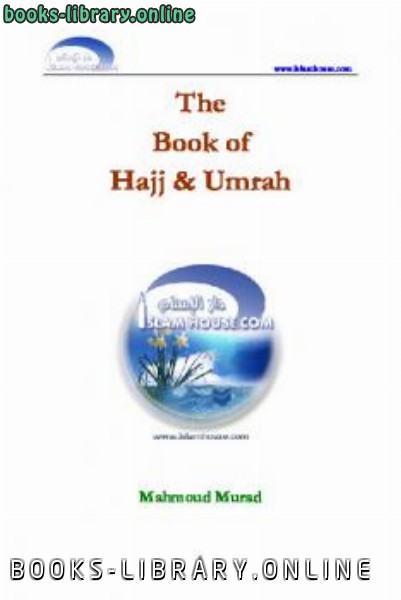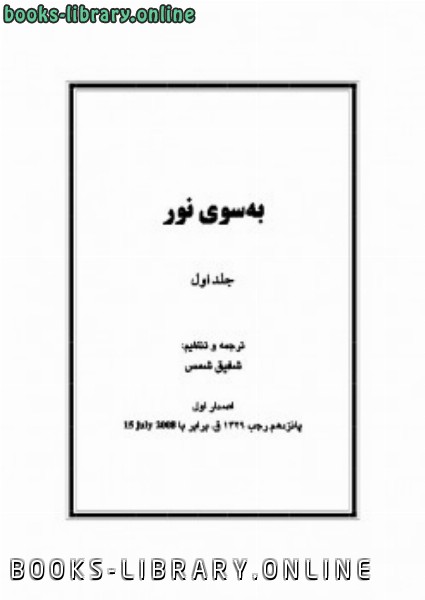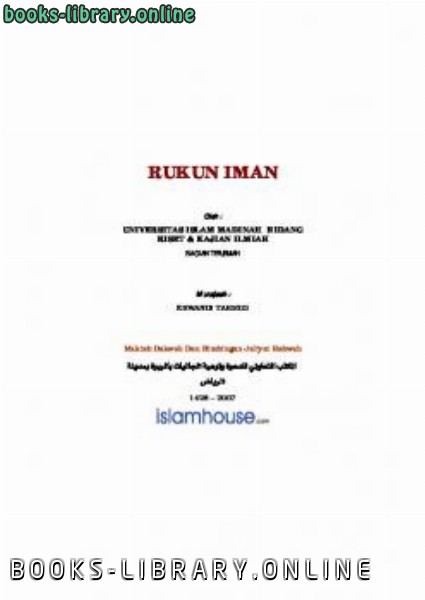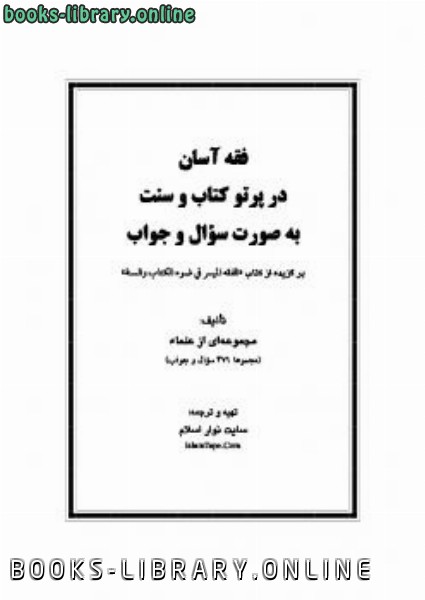كتاب Guarding the Tongue
All praise is for Allaah and may the peace and blessings be on His Final Messenger, his family and those who follow him in goodness until the Day of Recompense. To Proceed: Before you is a chapter from the great book Al-Adhkaar of the Imaam and great scholar of the seventh century, Abu Zaakariyaa, Yahyaa Ibn Sharaf An-Nawawee, which we decided to present as a book in itself due to the many benefits found in it. The chapter is entitled “Hifdh-ul-Lisaan” or “Guarding the Tongue.” The original source, Al-Adhkaar, is one of the prize works of Imaam An-Nawawee in which he compiles and discusses the texts related to what is recommended and forbidden from speech, focusing on adhkaar (words of remembrance) and ad’iyyah (supplications). In the last part of the book, as he explains, Imaam An-Nawawee devotes a chapter to what is forbidden and disliked from speech, such as backbiting, gossiping, and slander. So he brings the evidences from the Qur’aan and Sunnah on the obligation of guarding the tongue from evil speech. In recent times, this great work was checked and verified by Shaikh Saleem Ibn ‘Eid Al- Hilaalee and printed in two volumes. In his verification, Shaikh Saleem provides a grading for each hadeeth as well as a discussion into the reason for the hadeeth’s authenticity or weakness. Due to our desire to make the E-Book a source of easy reading and benefit, we have limited the verification of ahaadeeth to just the grade that Shaikh Saleem Al-Hilaalee has provided and the references of the Hadeeth sources they can be found in, while abridging his discussions of certain ahaadeeth in some places We advise every sincere Muslim to read and benefit from the words of An-Nawawee on this very important topic, which many Muslims are neglectful or unaware about. And we advise them to reflect sincerely on the evidences so that they can beware of falling into sinful speech. We hope that this treatise also helps to uplift doubts on the part of those who consider backbiting and criticizing to be forbidden unconditionally, as Imaam An-Nawawee explains the situations in which talking about someone in his absence is permissible, as well as the proper guidelines for that. Lastly, we ask Allaah to make this treatise serve as a source of knowledge for those unaware about the rulings on guarding the tongue and likewise, that He make this a reminder for those who know yet are neglectful. Written by: isma’eel alarcon for al-manhaj.com on January 22, 2002 Before you is a chapter from the great book AlAdhkaar of the Imam and great scholar of the seventh century, Abu Zakariyyah Yahya ibn Sharaf anNawawi. The chapter is entitled HifdhulLisaan or . The original source, AlAdhkaar, is one of the prize works of Imam anNawawi in which he compiles and discusses the texts related to what is recommended and forbidden from speech, focusing on aladhkaar words of remembrance and alad’iyah supplications . In the last part of the book, as he explains, Imam anNawawi devotes a chapter to what is forbidden and disliked from speech, such as backbiting, gossiping, and slander. So he brings the evidences from the Qur’aan and Sunnah on the obligation of guarding the tongue from evil speech. This great work was checked and verified by Shaikh Saleem ibn ’Eed alHilaali and printed in two volumes. In his verification, Shaikh Saleem provides a grading for each hadeeth as well as a discussion about the reason for the hadeeth’s authenticity or weakness. Due to a desire to make the ebook a source of easy reading and benefit, the verification of hadeeths have been limited to just the grade that Shaikh Saleem alHilaali has provided and the references of the hadeeth sources they can be found in, while abridging his discussions of certain hadeeths in some places.أبو زكريا يحي بن شرف النووي - أبو زكريا يحيى بن شرف الحزامي النووي الشافعي (631هـ-1233م / 676هـ-1277م) المشهور باسم "النووي" هو مُحدّث وفقيه ولغوي مسلم، وأحد أبرز فُقهاء الشافعية، اشتهر بكتبه وتصانيفه العديدة في الفقه والحديث واللغة والتراجم، كرياض الصالحين والأربعين النووية ومنهاج الطالبين والروضة، ويوصف بأنه محرِّر المذهب الشافعي ومهذّبه، ومنقّحه ومرتبه، حيث استقر العمل بين فقهاء الشافعية على ما يرجحه النووي. ويُلقب النووي بشيخ الشافعية، فإذا أُطلق لفظ "الشيخين" عند الشافعية أُريد بهما النووي وأبو القاسم الرافعي القزويني. ولد النووي في نوى سنة 631هـ، ولما بلغ عشر سنين جعله أبوه في دكان، فجعل لا يشتغل بالبيع والشراء عن تعلم القرآن الكريم وحفظه، حتى ختم القرآن وقد قارب البلوغ، ومكث في بلده نوى حتى بلغ الثامنة عشر من عمره، ثم ارتحل إلى دمشق. قدم النووي دمشق سنة 649هـ، فلازم مفتي الشام عبد الرحمن بن إبراهيم الفزاري وتعلم منه، وبقي النووي في دمشق نحواً من ثمان وعشرين سنة، أمضاها كلها في بيت صغير في المدرسة الرواحية، يتعلّم ويُعلّم ويُؤلف الكتب، وتولى رئاسة دار الحديث الأشرفية، إلى أن وافته المنية سنة 676هـ. ❰ له مجموعة من الإنجازات والمؤلفات أبرزها ❞ التبيان في آداب حملة القرآن ❝ ❞ شرح متن الأربعين النووية في الأحاديث الصحيحة النبوية ❝ ❞ رياض الصالحين ❝ ❞ المنهاج في شرح صحيح مسلم بن الحجاج (صحيح مسلم بشرح النووي) (ط. المطبعة المصرية بالأزهر) ❝ ❞ رياض الصالحين من كلام سيد المرسلين (ت: التركي) ❝ ❞ الأذكار من كلام سيد الأبرار (ت: الأرناؤوط) ❝ ❞ بستان العارفين (ط. البشائر) ❝ ❞ الأربعين النوويه ❝ ❞ الإيضاح في مناسك الحج والعمرة، وعليه الإفصاح على مسائل الإيضاح على مذاهب الأئمة الأربعة وغيرهم ❝ الناشرين : ❞ دار الكتب العلمية بلبنان ❝ ❞ مؤسسة الرسالة ❝ ❞ موقع دار الإسلام ❝ ❞ دار ابن حزم للطباعة والنشر والتوزيع ❝ ❞ المركز القومي للترجمة ❝ ❞ دار ابن الجوزي ❝ ❞ دار الفكر المعاصر ❝ ❞ وزارة الأوقاف والشؤون الإسلامية - قطر ❝ ❞ دار ابن كثير ❝ ❞ دار المنهاج للنشر والتوزيع ❝ ❞ دار السلام للطباعة والنشر والتوزيع والترجمة ❝ ❞ دار البشائر الإسلامية ❝ ❞ بيت الأفكار الدولية للنشر والتوزيع ❝ ❞ مكتبة التراث الاسلامي ❝ ❞ دار الصميعي للنشر والتوزيع ❝ ❞ مكتبة الصحابة ❝ ❞ دار ابن خزيمة للنشر والتوزيع ❝ ❞ مكتبة دار البيان ❝ ❞ دار النوادر للطباعة والنشر والتوزيع ❝ ❞ مكتبة نزار مصطفى الباز ❝ ❞ دار العقيدة ❝ ❞ مكتبة الإرشاد ❝ ❞ مؤسسة قرطبة ❝ ❞ جداول للنشر و التوزيع و الترجمة ❝ ❞ مكتبة غراس للنشر والتوزيع ❝ ❞ الدار الأثرية ❝ ❞ دار المأمون للثقافة والتراث ❝ ❞ إدارة الطباعة المنيرية ❝ ❞ دار الملاح للطباعه والنشر ❝ ❞ دور نشر متعددة ❝ ❞ مكتبة الاقتصاد الإسلامي ❝ ❞ الكتاب العالمي للنشر ❝ ❞ البلد الأمين ❝ ❞ سطور جديدة ❝ ❞ دار إسلامية ❝ ❞ دار الوسام ❝ ❱
من كتب إسلامية بلغات أخرى - مكتبة كتب إسلامية.

قراءة كتاب Guarding the Tongue أونلاين
معلومات عن كتاب Guarding the Tongue:
All praise is for Allaah and may the peace and blessings be on His Final Messenger, his family
and those who follow him in goodness until the Day of Recompense. To Proceed:
Before you is a chapter from the great book Al-Adhkaar of the Imaam and great scholar of
the seventh century, Abu Zaakariyaa, Yahyaa Ibn Sharaf An-Nawawee, which we decided to
present as a book in itself due to the many benefits found in it. The chapter is entitled
“Hifdh-ul-Lisaan” or “Guarding the Tongue.”
The original source, Al-Adhkaar, is one of the prize works of Imaam An-Nawawee in which he
compiles and discusses the texts related to what is recommended and forbidden from
speech, focusing on adhkaar (words of remembrance) and ad’iyyah (supplications). In the
last part of the book, as he explains, Imaam An-Nawawee devotes a chapter to what is
forbidden and disliked from speech, such as backbiting, gossiping, and slander. So he brings
the evidences from the Qur’aan and Sunnah on the obligation of guarding the tongue from
evil speech.
In recent times, this great work was checked and verified by Shaikh Saleem Ibn ‘Eid Al-
Hilaalee and printed in two volumes. In his verification, Shaikh Saleem provides a grading for
each hadeeth as well as a discussion into the reason for the hadeeth’s authenticity or
weakness. Due to our desire to make the E-Book a source of easy reading and benefit, we
have limited the verification of ahaadeeth to just the grade that Shaikh Saleem Al-Hilaalee
has provided and the references of the Hadeeth sources they can be found in, while
abridging his discussions of certain ahaadeeth in some places
We advise every sincere Muslim to read and benefit from the words of An-Nawawee on this
very important topic, which many Muslims are neglectful or unaware about. And we advise
them to reflect sincerely on the evidences so that they can beware of falling into sinful
speech. We hope that this treatise also helps to uplift doubts on the part of those who
consider backbiting and criticizing to be forbidden unconditionally, as Imaam An-Nawawee
explains the situations in which talking about someone in his absence is permissible, as well
as the proper guidelines for that.
Lastly, we ask Allaah to make this treatise serve as a source of knowledge for those unaware
about the rulings on guarding the tongue and likewise, that He make this a reminder for
those who know yet are neglectful.
Written by: isma’eel alarcon
for al-manhaj.com
on January 22, 2002
Before you is a chapter from the great book AlAdhkaar of the Imam and great scholar of the seventh century, Abu Zakariyyah Yahya ibn Sharaf anNawawi. The chapter is entitled HifdhulLisaan or . The original source, AlAdhkaar, is one of the prize works of Imam anNawawi in which he compiles and discusses the texts related to what is recommended and forbidden from speech, focusing on aladhkaar words of remembrance and alad’iyah supplications . In the last part of the book, as he explains, Imam anNawawi devotes a chapter to what is forbidden and disliked from speech, such as backbiting, gossiping, and slander. So he brings the evidences from the Qur’aan and Sunnah on the obligation of guarding the tongue from evil speech. This great work was checked and verified by Shaikh Saleem ibn ’Eed alHilaali and printed in two volumes. In his verification, Shaikh Saleem provides a grading for each hadeeth as well as a discussion about the reason for the hadeeth’s authenticity or weakness. Due to a desire to make the ebook a source of easy reading and benefit, the verification of hadeeths have been limited to just the grade that Shaikh Saleem alHilaali has provided and the references of the hadeeth sources they can be found in, while abridging his discussions of certain hadeeths in some places.
للكاتب/المؤلف : أبو زكريا يحي بن شرف النووي .
دار النشر : .
عدد مرات التحميل : 4080 مرّة / مرات.
تم اضافته في : الأربعاء , 27 مارس 2019م.
حجم الكتاب عند التحميل : 544.6 كيلوبايت .
تعليقات ومناقشات حول الكتاب:
1. Introduction to the Book.................................................................... 5
2. Guarding the Tongue.......................................................................... 6
3. The Prohibition of Backbiting and Gossiping....................................... 13
4. Important Points Related to the Limits of Backbiting..................... 17
5. How does one Prevent Himself from Backbiting?.............................. 20
6. What Type of Backbiting is Permissible?............................................ 21
7. What should One do when he hears his Shaikh, Friend or Someone
else being Backbitten?............................................................................
25
8. The Backbiting of the Heart................................................................ 28
9. Expiating oneself and Repenting from Backbiting......................... 31
10. Concerning Gossiping (Nameemah)................................................. 34
All praise is for Allaah and may the peace and blessings be on His Final Messenger, his family
and those who follow him in goodness until the Day of Recompense. To Proceed:
Before you is a chapter from the great book Al-Adhkaar of the Imaam and great scholar of
the seventh century, Abu Zaakariyaa, Yahyaa Ibn Sharaf An-Nawawee, which we decided to
present as a book in itself due to the many benefits found in it. The chapter is entitled
“Hifdh-ul-Lisaan” or “Guarding the Tongue.”
The original source, Al-Adhkaar, is one of the prize works of Imaam An-Nawawee in which he
compiles and discusses the texts related to what is recommended and forbidden from
speech, focusing on adhkaar (words of remembrance) and ad’iyyah (supplications). In the
last part of the book, as he explains, Imaam An-Nawawee devotes a chapter to what is
forbidden and disliked from speech, such as backbiting, gossiping, and slander. So he brings
the evidences from the Qur’aan and Sunnah on the obligation of guarding the tongue from
evil speech.
In recent times, this great work was checked and verified by Shaikh Saleem Ibn ‘Eid Al-
Hilaalee and printed in two volumes. In his verification, Shaikh Saleem provides a grading for
each hadeeth as well as a discussion into the reason for the hadeeth’s authenticity or
weakness. Due to our desire to make the E-Book a source of easy reading and benefit, we
have limited the verification of ahaadeeth to just the grade that Shaikh Saleem Al-Hilaalee
has provided and the references of the Hadeeth sources they can be found in, while
abridging his discussions of certain ahaadeeth in some places
We advise every sincere Muslim to read and benefit from the words of An-Nawawee on this
very important topic, which many Muslims are neglectful or unaware about. And we advise
them to reflect sincerely on the evidences so that they can beware of falling into sinful
speech. We hope that this treatise also helps to uplift doubts on the part of those who
consider backbiting and criticizing to be forbidden unconditionally, as Imaam An-Nawawee
explains the situations in which talking about someone in his absence is permissible, as well
as the proper guidelines for that.
Lastly, we ask Allaah to make this treatise serve as a source of knowledge for those unaware
about the rulings on guarding the tongue and likewise, that He make this a reminder for
those who know yet are neglectful.
Written by: isma’eel alarcon
for al-manhaj.com
on January 22, 2002
“Not a word does one utter, except that there is an (angel) Watching, Ready to
record it.” [Surah Qaaf: 18]
And He says:
“Verily, your Lord is Ever-Watchful." [Surah Al-Fajr: 14]
I have mentioned previously, what Allaah made easy for me from the recommended types
of remembrances. I also wanted to include along with that, the things that are disliked
and forbidden in one’s speech. This is in order that this book can be complete in regards
to the ruling s concerning one’s verbal statements, and comprehensive in regards to
explaining their different categories. So I will mention some aspects about them that
every Muslim must be aware of. A majority of the things I will state here are already well
known, and for this reason, I will not include the evidences for most of them. Thus, with
Allaah lies the success.
Know that every individual who falls under the category of being responsible for his
actions (mukallaf) must guard his tongue from all types of speech, except for that
speech which consists predominantly of some benefit. So in the situation that speaking
and refraining from speech are both found to contain the same amount of benefit within
them, then the Sunnah is to refrain from it, altogether. This is because the allowable
speech (equal in benefit and harm) paves the way towards that which is forbidden as well
as disliked. Rather, in most cases, this will be the result, and applying safety, at that
point, will not be able to soothe it in the least.
Abu Hurairah (radyAllaahu ‘anhu) reported that the Prophet (sallAllaahu ‘alayhi wa sallam)
said: "Whosoever believes in Allaah and the Last Day, then let him speak good
or remain silent." 1
1 Saheeh - Reported by Al-Bukhaaree (11/308 of al-Fath) and Muslim (47)
Guarding the Tongue of Imaam An-Nawawee
www.al-manhaj.com Al-Manhaj E-Books 7
This hadeeth, of which the scholars have agreed upon its authenticity, is a clear-cut proof
that one should not talk, unless his speech is good – and that is the speech that consists
predominantly of benefit. So if one has doubt as to whether or not his speech consists of
benefit, then he should not speak.
Imaam Ash-Shaafi'ee (rahimahullaah) said: "When one desires to talk, then it is upon him
to think before he speaks. If there is beneficial good in what he will say, then he should
speak. And if he has doubt about that, then he must not speak until he clears that doubt
(by making his speech good)."
Abu Moosaa Al-Ash'aree (radyAllaahu ‘anhu) reported: "I said: 'O Messenger of Allaah!
Which of the Muslims is best?' He (sallAllaahu ‘alayhi wa sallam) responded: 'He whose
tongue and hand the Muslims are safe from.'" 2
Sahl Ibn Sa'ad (radyAllaahu ‘anhu) reported that Allaah’s Messenger (sallAllaahu ‘alayhi
wa sallam) said: "Whoever can guarantee for me (that he will guard) what is
between his jaws (tongue) and what is between his legs (private parts), I will
guarantee for him Paradise." 3
Abu Hurairah (radyAllaahu ‘anhu) reported that he heard the Prophet (sallAllaahu ‘alayhi
wa sallam) say: "Indeed, the servant (of Allaah) will speak a word, while being
unaware of (its consequences), and due to it, he will be cast into the Hellfire,
farther than the distance between the east and the west." 4
In the narration of Al-Bukhaaree, there only occur the words: “farther than the
distance between the west” without mentioning the east. The meaning of "while
being unaware" is that he does not stop to consider whether his speech is good or not.
Abu Hurairah (radyAllaahu ‘anhu) reported that the Prophet (sallAllaahu ‘alayhi wa sallam)
said: "Indeed, the servant will speak words that are pleasing to Allaah, due to
which he will be given a condition in which Allaah will raise him many levels.
And indeed, the servant will speak words that are displeasing to Allaah, due to
which he will not be given a good condition, but (instead) be thrown into the
Hellfire."
Before you is a chapter from the great book AlAdhkaar of the Imam and great scholar of the seventh century, Abu Zakariyyah Yahya ibn Sharaf anNawawi. The chapter is entitled HifdhulLisaan or . The original source, AlAdhkaar, is one of the prize works of Imam anNawawi in which he compiles and discusses the texts related to what is recommended and forbidden from speech, focusing on aladhkaar words of remembrance and alad’iyah supplications . In the last part of the book, as he explains, Imam anNawawi devotes a chapter to what is forbidden and disliked from speech, such as backbiting, gossiping, and slander. So he brings the evidences from the Qur’aan and Sunnah on the obligation of guarding the tongue from evil speech. This great work was checked and verified by Shaikh Saleem ibn ’Eed alHilaali and printed in two volumes. In his verification, Shaikh Saleem provides a grading for each hadeeth as well as a discussion about the reason for the hadeeth’s authenticity or weakness. Due to a desire to make the ebook a source of easy reading and benefit, the verification of hadeeths have been limited to just the grade that Shaikh Saleem alHilaali has provided and the references of the hadeeth sources they can be found in, while abridging his discussions of certain hadeeths in some places.
 مهلاً !
مهلاً !قبل تحميل الكتاب .. يجب ان يتوفر لديكم برنامج تشغيل وقراءة ملفات pdf
يمكن تحميلة من هنا 'تحميل البرنامج'

نوع الكتاب : pdf.
اذا اعجبك الكتاب فضلاً اضغط على أعجبني و يمكنك تحميله من هنا:


كتب اخرى في كتب إسلامية بلغات أخرى
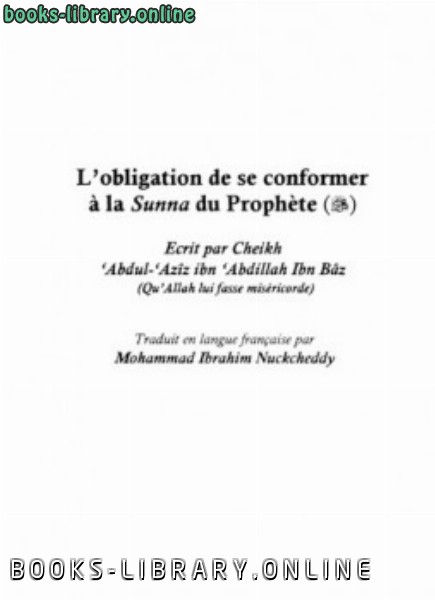
L rsquo obligation de se conformer agrave la sunna du Proph egrave te sur lui la paix PDF
قراءة و تحميل كتاب L rsquo obligation de se conformer agrave la sunna du Proph egrave te sur lui la paix PDF مجانا
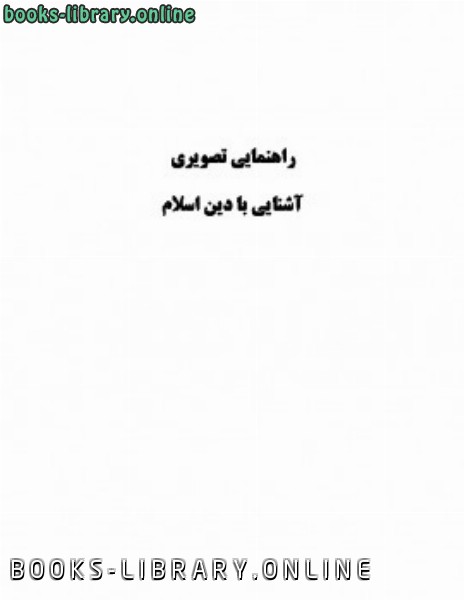
راهنمایی تصویری آشنایی با دین اسلام PDF
قراءة و تحميل كتاب راهنمایی تصویری آشنایی با دین اسلام PDF مجانا
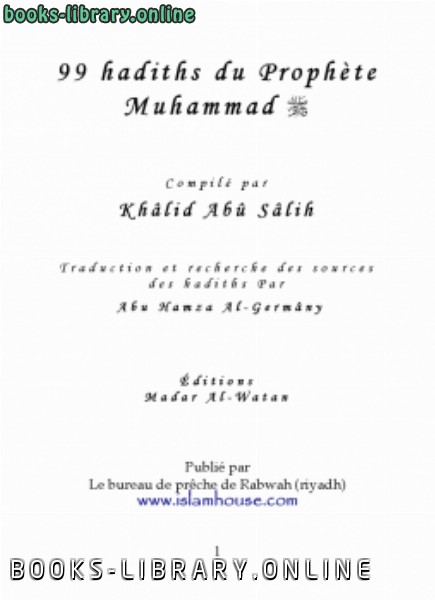
99 hadiths du Proph egrave te Muhammad PDF
قراءة و تحميل كتاب 99 hadiths du Proph egrave te Muhammad PDF مجانا


